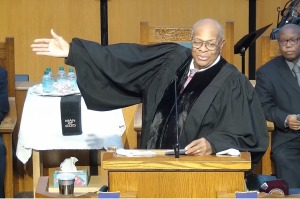Natural Disasters: When We Try to Speak for God
Why is calamity, the time we most need God's presence in pain, a time we tend to mouth off?
Why, when pain and agony are all around, do we think theological pronouncements are the best response?
Why, when displays of destruction fill the airwaves, are we given to speculate as to the ways and motives of God?
I say "we" because I, too, am prone for my mouth to wander. Lord, I feel it.
Pastors and former pastors, perhaps, fall more quickly into this trap than others. After all, when we preach we are expected to bring some kind of encouragement, exhortation, correction or instruction based on our best understanding of God's word. It is a dangerously short step from the Sunday morning sermon to the weekday commentary; from relating scripture and child rearing to announcing why God flooded a town.
While it is always good to want to speak words of hope or instruction there comes a time when the mic needs to be given to someone else. That time would be when the words repeatedly have the opposite of the intended effect. No one should get a free pass when his or her words continue to hinder the Word.
Some seem more adept than others at speaking out of turn to be sure. Let a calamity occur, especially something related to "natural disaster," and it breaks loose. With all the sympathy of a firing squad missives are launched to waiting fans and a stupefied world. Responding unbelievers are often have a better understanding of how we should be responding than do we.
Ann Voskamp's words today are a pattern for all of us.
God has a heart. And it hurts. Not with just with a a few drops of ache, not just with a slow drip of sadness - His whole massive heart fills, swells, burns with this raw, relentless pain.
In the midst of the storm, all the emptiness of God floods with pain.
What grieving mother in Oklahoma could wake up today and forget her little one, could forget the way she smelled, the way her hair fell, the way his arms felt around her neck - what mother could just up and forget her always-baby?
And God whispers hoarse: That mother whose heart is bound to her child's - doesn't compare to how your Father's heart is bound to you. {Isa 49:15}
The Lord of the Universe, He's lashed Himself to us. And He didn't need to. But He tied the knot Himself. God who hung the stars, He takes a thread of His heart and ties His to ours. God tied His heart to yours so when you feel pain - He fills with shattering pain.
So when we howl: "If there's a God who really cares, He'd look at this world and His heart would break."
And God looks to the Cross and says -- It did. [Emphasis hers.]
Empathy is not my spiritual gift. It is not any part of my being without great sensitivity to the Holy Spirit. Even then I miss the boat too often. As such these words are self-aware.
The interconnected, always on, instant-access world in which we live can itself be a natural disaster. Even biblically accurate comments can come across as cold hearted and callous if not given in the right way. It is the word "spoken at the right time" that "is like apples on a silver tray" (Prov. 25:11, HCSB). The Pharisees and Scribes had little problem with biblical pronouncements. They had a terrible problem with accuracy.
Sometimes words are not even the greatest need. Even Job's three friends, Eliphaz, Bildad and Zophar, waited until the end of a seven day period of grief before going all Theology 601 on him (Job 2:12-13).
While images of ruined elementary schools and reports of the dead are still pouring forth, "weeping with them that weep" might be the most Jesus-like thing we can do (Romans 12:15). It certainly beats using them as case studies for theological propositions.
If the best we can do it postulate as to why God may or may not have done something, perhaps a better response would be to join disaster relief and clear some debris. Our presence is God's presence to the wounded, the hurting, the dying and they will exegete it as such. Careless words do not earn us credibility. Good news is sometimes felt before it is heard and heeded.





























